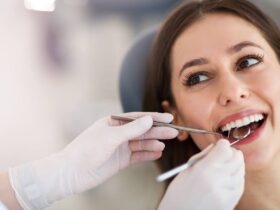What is PCOS? Well, it’s a common endocrine disorder that can be quite difficult to live with. In this blog post, we will discuss what causes the condition, how you might know if you have it and how best to treat it.
It’s important to understand the symptoms of PCOS because once diagnosed; there are steps that should be taken in order to help manage your condition. With the help of your Bajaj Health EMI Card, you can cover all the major expenses related to your PCOS treatments.
What Do You Need To Know About PCOS?
PCOS is a health condition where there are hormonal imbalances. It’s caused by an imbalance of the sex hormones estrogen and progesterone, which can interfere with ovulation – leading to irregular periods or even infertility in some cases. Those who have Polycystic ovary syndrome usually don’t make much testosterone, so they tend to produce too many male hormones called ‘androgens.
The symptoms can vary depending on your age. For example, those who have an early onset and are still teens may not show any symptoms yet.
The amount of the hormone progesterone can also affect the severity of PCOS symptoms, which is why some women with PCOS may not have any symptoms at all, depending on their levels.
Below, we will go over some of the symptoms that you should be aware of.
- Irregular cycles: irregular menstrual cycles can indicate a PCOS diagnosis. A woman with PCOS might cycle anywhere from once every two years to more than six months apart and have prolonged periods or no menstruation at all.
- Infertility: Another major symptom of PCOS is infertility. Women with the condition may have problems getting pregnant because their ovaries don’t make eggs properly or they release them too quickly, which can lead to a shorter fertility window.
- Balding and excess hair growth: Women who develop more testosterone than normal tend to lose their hair on different parts of their body as well as experience excessive hair growth.
- Acne: Women with PCOS are also more likely to have oily skin and breakouts, which can be especially damaging for teenagers who may already feel self-conscious about their appearance.
- Weight gain: It’s not uncommon for women with PCOS to put on weight as a result of the condition because many people with PCOS are insulin-resistant and can’t properly manage their weight.
- Skin problems: Acne isn’t the only skin problem women with PCOS have to worry about – some people develop a condition called seborrhea, which is characterized by scaly patches on the face that resemble psoriasis or eczema.
What Are The Causes Of PCOS?
- PCOS can be inherited
- If your mother has it, you have a 50% chance of developing it.
- If both parents have it, the risk is higher – 75%.
- Some women are at an increased risk of getting PCOS, such as:
- People who have a family history of the condition.
- Women over 40 years old.
- Those with insulin resistance or diabetes (either Type I or II).
- Incidence is higher in those from certain ethnicities – African Americans and Hispanics
- PCOS can be caused by environmental factors:
- Diet – those who consume a lot of junk food or too many carbs are more likely to develop PCOS.
- Stressful life events – for example, physical abuse as children, sexual assault in adulthood, etc.
- Large doses of certain medications, such as corticosteroids
What Are The Treatments?
If left untreated, PCOS can lead to several long-term health problems such as infertility or insulin resistance. We have a number of treatments available which are tailored for each individual’s needs:
- Diet – The first line of treatment is dietary changes. A well-balanced diet and a healthy lifestyle will help the patient control her weight and blood sugar levels.
- Physical activity – Regular physical exercise will help the patient lose weight, improve insulin sensitivity, reduce stress levels, etc.
- Medications – individualized therapeutic programs for those suffering from PCOS may include birth control pills or other medications to treat symptoms such as acne, etc. For hormonal imbalance caused by an excess of testosterone, birth control pills may not be enough, and other medications are needed.
- Fertility treatments – for those who wish to become pregnant, fertility treatments such as Clomid and ovulation induction may be advised.
Conclusion
PCOS is a disease of the reproductive system which produces symptoms like acne, hair loss on the face and chest, menstrual cycle irregularities, etc. Causes are unknown, but it may be exacerbated by obesity, unbalanced diet or activity levels, etc. Some treatment options include medications to regulate hormones, such as birth control pills and other drugs for those with hormonal imbalances. It is important to select the best gynecologist in Kolkata to get the ideal treatment.








Leave a Reply